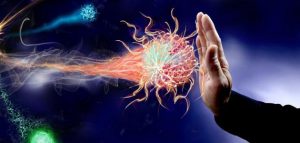العلاج بالخلايا الجذعية في اوكرانيا – العلاج الخلوي و الطب التجديدي
autoimmune diseases
Autoimmune diseases
Stem Cell Therapy for Autoimmune Diseases

How can stem cells help treat autoimmune diseases?
Currently, autoimmune conditions are treated with immune suppressive agents such as steroids, methothrexate, cyclosporine, gold, and more recently infliximab (Remicade). Despite inducing temporary improvement, these approaches possess the possibility of long-term adverse effects, as well as need for life-long treatment.
Stem cell therapy has been demonstrated to induce profound healing activity in animals with various forms of autoimmune disorders. Besides healing damaged tissues, stem cells have the unique ability to modulate the immune system so as to shut off pathological responses while preserving its ability to fight off disease. Stem cells and specifically, mesenchymal stem cells home to inflamed tissue and start producing anti-inflammatory agents. These mediators act locally and do not suppress the immune response of the patient’s whole body. Additionally, mesenchymal stem cells induce the production of T regulatory cells, a type of immune cell whose function is to protect the body against immunological self-attack.
What are the autoimmune diseases?
Autoimmune diseases are conditions in which the patient’s immune system generates cellular and antibody responses to substances and tissues normally present in the body. This might be restricted to one organ or involve a particular tissue in different places. As a result of this immune response, damage to different organs occurs. Examples of autoimmune diseases that have responded to stem cell therapy either in animals or humans include rheumatoid arthritis, multiple sclerosis, and lupus.
If you would like more information, please complete this brief Information Request and we will be in touch shortly.
Autoimmune diseases are a group of diseases that are caused by the immune system, when it starts to attack and damage the organs or tissues of your body instead of fighting infections.
There are a lot of diseases that are generally considered autoimmune, and here are the most common autoimmune diseases:
- Rheumatoid arthritis
- Hashimoto’s autoimmune thyroiditis
- Celiac disease
- Graves’ disease
- Diabetes mellitus, type 1
- Vitiligo
- Rheumatic fever
- Pernicious anemia/atrophic gastritis
- Alopecia areata
- Immune thrombocytopenic purpura
Symptoms:
Symptoms in general depends on the type of the disorder, but there are common symptoms may happen to all patients like:
Fatigue.
Skin problems.
Abdominal pain or digestive issues.
Recurrent fever.
Stem Cell Treatment: Autoimmune disease Protocols
Treatment Autoimmune diseases protocol will be assigned by staff physicians after the patient has submitted all requested medical information and received approval. A patient’s recommended protocol may differ from the example given below.
- Treatment duration: 4 days and 5 nights.
- Physical examination and blood testing: Monday.
- 3 IV injections of expanded allogeneic (low-passage) mesenchymal stem cells.
What are the advantages of treating autoimmune diseases with allogeneic umbilical cord tissue-derived stem cells?
- Since HUCT mesenchymal stem cells are immune system privileged, cell rejection is not an issue and Human Leukocyte Antigen (HLA) matching is not necessary.
- The stem cells with the best anti-inflammatory activity, immune modulating capacity, and ability to stimulate regeneration can be screened and selected
- Allogeneic stem cells can be administered multiple times over the course of days in uniform dosages that contain high cell counts.
- Umbilical cord tissue provides an abundant supply of mesenchymal stem cells.
- No need to collect stem cells from the patient’s hip bone or fat under anesthesia, which especially for small children and their parents, can be an unpleasant ordeal.
- There is a growing body of evidence showing that umbilical cord-derived mesenchymal stem cells are more robust than mesenchymal stem cells from other sources.
-
No need to administer chemotherapy drugs like Granulocyte-colony stimulating factor (G-CSF or GCSF) to stimulate the bone marrow to produce granulocytes and stem cells and release them into the bloodstream.
Is their treatment for autoimmune diseases?
While there is no cure for an autoimmune condition, treatments Autoimmune diseases can reduce or eliminate symptoms or relatively delay disease progression, and in some cases, taking alternative medications can help provide treatment when the body is unable to naturally produce what it requires.
These conditions include type 1 diabetes, in which the body cannot produce enough insulin, and thyroid autoimmune diseases where there isn’t enough thyroid hormone, then we can give patients these hormones orally using certain medications.
And we can give paitents medication to reduce the symptom Autoimmune diseasess like pain, inflammation, weakness, and fatigue.
